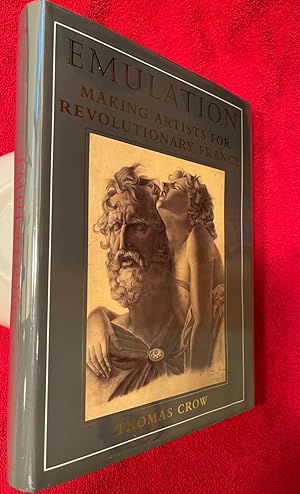Emulation: Making Artists for Revolutionary France (First Edition)
Thomas E. Crow
Da
CWM Rare Books, LLC, Rochester, NY, U.S.A.
Valutazione del venditore 5 su 5 stelle
![]()
Venditore AbeBooks dal 20 luglio 2022
Riguardo questo articolo
Descrizione:
Free UPS ground shipping & insurance in USA 48. Condition: Like New in publishers cloth in like new dust jacket. 365pp. Illustrated throughout. First edition of this comprehensive study. This book puts the life of the artist at the center of innovative art history, narrating a biography of five painters at the center of events in Revolutionary France: Jacques Louis-David and his extraordinarily precocious pupils Drouais, Girodet, Gerard, and Gros. Their shared ambition was to build an alternative, exalted life in art, one committed to rigorous classical erudition while suffused with the emotional depth of familial bonds. In this experiment of enlightened teaching, the roles of master and pupil were frequently reversed. Thomas Crow tells how the personal histories and aesthetic choices of these artists were played out within the larger arena in which a whole social order was being overturned, a king embodying all patriarchal authority was put to death, and a republic of equal male brotherhood was proclaimed. The revolutionary ideal of male fraternity was just one of many shifts in the philosophical underpinnings of the visual arts, the sum of which moved painting more and more into an exclusively masculine frame of reference. In their paintings these artists found themselves compelled to define the entire spectrum of desirable human qualities - from battlefield heroics to eroticized corporeal beauty - as properties of the male sex alone. This process both reinforced and complicated the bonds of emotion and mutual identification between them. That imaginative aspiration toward a single-sex utopia proved in the end to be inseparable from a tragic artistic vision of unendurable suffering in which fathers and sons found themselves hopelessly at odds. In the practical conduct of their lives and careers, the young Davidians found all too often the costs of their vocation to be prolonged illness, dispiriting exile, waste of talent, psychological traumas of shattered friendship, embittered resentment, and mourning - and in one instance, early death. The outcome of the Revolution, which would have accelerated the fragmenting tendencies within any family, cost them their intellectual and spiritual home in David's studio. Other studios would multiply, but with the end of this one - as much a condition of mind as a practical place of work - classicism itself came to signify loss, retrospection, and regret. Codice articolo 0072
Riassunto:
This book puts the life of the artist at the centre of innovative art history, narrating a biography of five painters at the centre of events in Revolutionary France: Jacques Louis-David and his extraordinarily precocious pupils Drouais, Girodet, Gerard, and Gros. Their shared ambition was to build an alternative, exalted life in art, one committed to rigorous classical erudition while suffused with the emotional depth of familial bonds. In this experiment of enlightened teaching, the roles of master and pupil were frequently reversed. Thomas Crow tells how the personal histories and aesthetic choices of these artists were played out within the larger arena in which a whole social order was being overturned, a king embodying all patriarchal authority was put to death, and a republic of equal male brotherhood was proclaimed. The revolutionary ideal of male fraternity was just one of many shifts in the philosophical underpinnings of the visual arts, the sum of which moved painting more and more into an exclusively masculine frame of reference. In their paintings these artists found themselves compelled to define the entire spectrum of desirable human qualities - from battlefield heroics to eroticised corporeal beauty - as properties of the male sex alone. This process both reinforced and complicated the bonds of emotion and mutual identification between them. That imaginative aspiration toward a single-sex utopia proved in the end to be inseparable from a tragic artistic vision of unendurable suffering in which fathers and sons found themselves hopelessly at odds. In the practical conduct of their lives and careers, the young Davidians found all too often the costs of their vocation to be prolonged illness, dispiriting exile, waste of talent, psychological traumas of shattered friendship, embittered resentment, and mourning - and in one instance, early death. The outcome of the Revolution, which would have accelerated the fragmenting tendencies within any family, cost them their intellectual and spiritual home in David's studio. Other studios would multiply, but with the end of this one - as much a condition of mind as a practical place of work - classicism itself came to signify loss, retrospection, and regret.
Product Description: Book by Crow Professor Thomas
Dati bibliografici
Titolo: Emulation: Making Artists for Revolutionary ...
Casa editrice: Yale University Press
Data di pubblicazione: 1994
Legatura: Hardcover
Condizione: As New
Condizione sovraccoperta: As New
Edizione: 1st Edition




